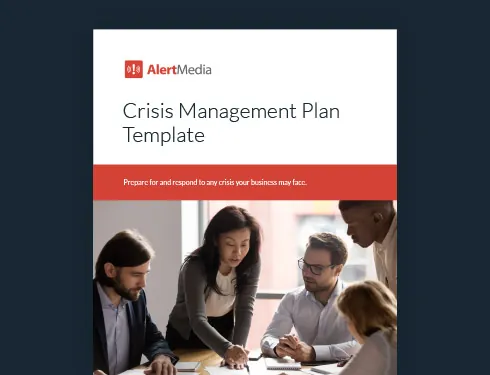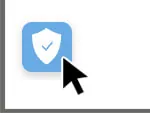
Crisis Management Skills: Effective Leadership for All Hazards
Set your leaders up to effectively mitigate harm to your people and business. Here’s how to ensure your team has the necessary crisis management skills.

Your crisis management strategies are only as effective as your leadership team. If you don’t have the right people leading your efforts, even the most detailed, well-tested plan will run into problems.
Regardless of the specific crisis—a natural disaster, a pandemic, or any other unforeseen event—you need the right people leading your response efforts to ensure successful crisis management. However, people aren’t born ready to manage a crisis situation. They develop those skills through feedback, testing, and drills. Here’s what you can do to prepare your crisis response team with the skills to thrive in difficult situations.
Download Our Crisis Management Plan Template
Leadership in Crisis
Many organizations make the mistake of focusing too much on situational details and not enough on well-rounded crisis management skills. Too often, organizations choose leaders with strong technical skills based on specific situations but overlook the critical soft skills needed to make decisions during a crisis.
This is something that Eric McNulty, Associate Director at The National Preparedness Leadership Initiative, pointed out in a recent interview with The Employee Safety Podcast. McNulty noted that many organizations invest heavily in teaching their crisis leaders strong technical skills but rarely invest in soft leadership skills.
McNulty describes this limited focus as a massive oversight because crisis management skills are leadership skills. Crisis management leadership goes beyond just what to do. It’s “how to be, how to think, and how to come into a situation where you can bring people together and move them toward the best possible outcome in a unified manner.”
That’s why, as you choose leaders for your disaster teams, you need leaders with cross-compatible skills who can manage various types of crises. This is similar to the all-hazards approach for emergency preparedness, where you use common response elements to establish a standard course of action, ensuring a more effective and efficient crisis response. Just as you should have an all-hazards strategy, you should have an all-hazards crisis management team with strong, well-rounded leadership skills.
Core Crisis Management Team Skills
Effective crisis management leadership is vital to business continuity. You will need a team with the following roles and skills to manage your crisis management planning and critical actions during a crisis.
- Chief Decision-Maker: This person acts as the final decision-maker in the response. Though they don’t necessarily need to be the CEO, they do need the skills and the power to act on decisions without delay. They will need to quickly and accurately assess information and then make rapid decisions that could impact employees’ safety and business operations.
- Necessary skills: Emotional intelligence, delegation, confidence
- Deputy Decision-Maker: This person acts as the chief decision-maker if the primary is unavailable. They should have the same skillset to act in times of crisis and be specifically familiar with continuity plans to support the change in leadership.
- Necessary skills: Adaptability/flexibility, quick thinking, clear-headedness
- Rapid Response Team Coordinator: This part of the team is responsible for project management tasks, like coordinating the allocation of resources, setting clear timelines, tracking progress, and ensuring all elements of incident management are executed efficiently and effectively.
- Necessary skills: Organization, time management, problem-solving
- Senior Communication Leader: This individual is responsible for emergency/crisis communication. They manage the strategic release of information, anticipating the needs and concerns of the company’s stakeholders to determine what they require to ensure their safety and well-being.
- Necessary skills: High critical thinking, clear communication, forward-thinking
- Communication Manager: The communications manager is an implementer. They work closely with the senior communication leader to disseminate information and ensure the crisis communication plan works effectively.
- Necessary skills: Clear-spoken, attention to detail, team-oriented
- Subject Matter Experts: These individuals provide specific expertise on the situation—meaning you may have different SMEs for different disasters. They will act in a consulting role, providing information the rest of the team uses for risk mitigation and emergency response. You may bring these experts in during the strategic planning phase and/or the response phase.
- Necessary skills: Direct experience/authority, communication skills, empathy
The soft skills your crisis management team displays will inspire employees to follow proper steps during an emergency. While the roles above require specific skills to suit the responsibilities, some crisis management skills are more universal. Here are five crisis management skills all your leaders must master to keep employees safe and ensure enterprise resilience:
5 Core Crisis Management Skills |
|
Testing Communication and Adaptability With Tabletop Exercises
Steven Kuhr, crisis management expert and founder of the Kuhr Group, LLC, believes that testing is critical to developing crisis management skills in people. As he puts it, “People have incredible talent and incredible capability once you test them.”
In a recent interview on The Employee Safety Podcast, Kuhr discusses how he was able to help a critical institution that provides services to Homeland Security maintain business operations during a crisis. He organized a tabletop exercise based on a train derailment, allowing the facility to test its continuity plan. During that exercise, he talked the team members through the scenario and allowed them to test their responses.
As they completed the scenario, he ramped up the difficulty, adding new challenges that changed how the team would adapt and respond. These injects also allowed them to test their contingency plans and fix gaps. The exercise encouraged effective communication, helping them to improve their response collaboratively. It also helped the participants carry these communication and adaptability skills to the subsequent phases of soliciting feedback and running a full-scale exercise.
Soliciting Feedback From Team Members to Foster Empathy
Eric McNulty at NPLI identifies one common mistake leaders make when responding to difficult situations: focusing on what the emergency management team thinks is important and not the rest of the team members. McNulty notes that unless you’re addressing what the individuals believe to be the immediate threat, you won’t be able to gain their buy-in during your emergency response.
Cooperation is a skill everyone in the organization needs to weather a disaster. If workers don’t feel heard and customers feel overlooked, they won’t listen when you talk. Addressing all stakeholders’ concerns is critical for cultivating cooperation, and cooperation is critical for successful crisis management. You can solicit feedback in different ways, including surveys, hot washes, and after-action reviews.
Surveys | Hot Washes | After-Action Reviews |
| Surveys provide a structured way to gather valuable insights from your team members, response team, and other stakeholders. These surveys can address specific crisis response aspects, such as communication effectiveness, resource allocation, or overall satisfaction. You can conduct surveys at different stages of the crisis to ensure continuous improvement. | Hot washes are informal discussions held shortly after a critical event or exercise. They provide a real-time opportunity to discuss the emergency response and capture immediate impressions. Conducting these in a timely manner may help you gather more minor insights that you’d usually miss in a more formal review.
| After the crisis has been resolved, conducting comprehensive after-action reviews is essential. These reviews involve a thorough analysis of the crisis response, examining what went well, what could have been done differently, and what lessons you can implement for future incidents.
|
Building Collaboration and Critical Thinking Through Drills
An essential aspect of cultivating crisis management skills in leaders is allowing them to apply these skills in a true-to-life setting. Emergency drills that provide a realistic environment for testing can help to refine incident response plans and practice critical thinking when the stakes are lower.
A full-scale drill was the approach Steven Kuhr took when he helped a Homeland Security contractor who provides critical financial services to the agency. After testing a hypothetical train derailment in tabletop exercises, they elevated their preparedness efforts with a full-scale drill. This exercise included establishing an incident command post and testing unified incident command procedures, which were previously absent in the region. All key stakeholders—including fire/rescue, EMS, law enforcement, and disaster response organizations—collaborated on the simulated response.
The drill enabled them to identify and rectify critical gaps in their response plan. Not even six weeks after this preparation, Steven reports that a train derailment occurred in the area where they had previously conducted a test. The local fire chief reached out to Steven to express gratitude, acknowledging that their level of preparedness would have been significantly lower without the drill. They were able to avoid a financial crisis and maintain business continuity.
Steven’s drill serves as a valuable model for developing your strategies for crisis management. Specifically, in running drills, Steven encourages:
- Realism — Steven’s drill was based on a realistic scenario that actually occurred six weeks later. When planning your drills, select scenarios you’re likely to face in your specific context. This approach is the best use of your time and resources.
- Unified incident command — Steven also incorporates testing of unified incident command procedures into the drill. This ensures all response teams and stakeholders work together cohesively.
- Gap identification — The drill was an opportunity to identify and address critical gaps in the response plan related to communication, resource allocation, and decision-making processes. Fortunately, they had already identified and closed those gaps when an actual disaster happened down the road.
- Feedback and improvement sessions — After the drill, the team gathered feedback from participants and stakeholders. It was then used to refine the crisis management plan and address shortcomings.
- Gratitude and recognition — Steven’s recommendation to practice emotional intelligence was to acknowledge and express gratitude for the participants’ efforts in the drill. Recognition from local authorities and stakeholders can reinforce the significance of preparedness efforts and motivate continued commitment.
Teaching Your Team to Prepare and Respond to Crises
The most effective way to develop crisis management skills is through practice. It’s similar to refining any other skill. You begin with the fundamentals and progress to more intricate scenarios, transitioning from basic tabletop exercises to full-scale drills. Success doesn’t require a team of naturally gifted leaders; you just need a team willing to invest effort in developing the soft skills that will guide them through any hazard. Download our crisis management plan template to make preparing your team and planning your crisis response easier.




